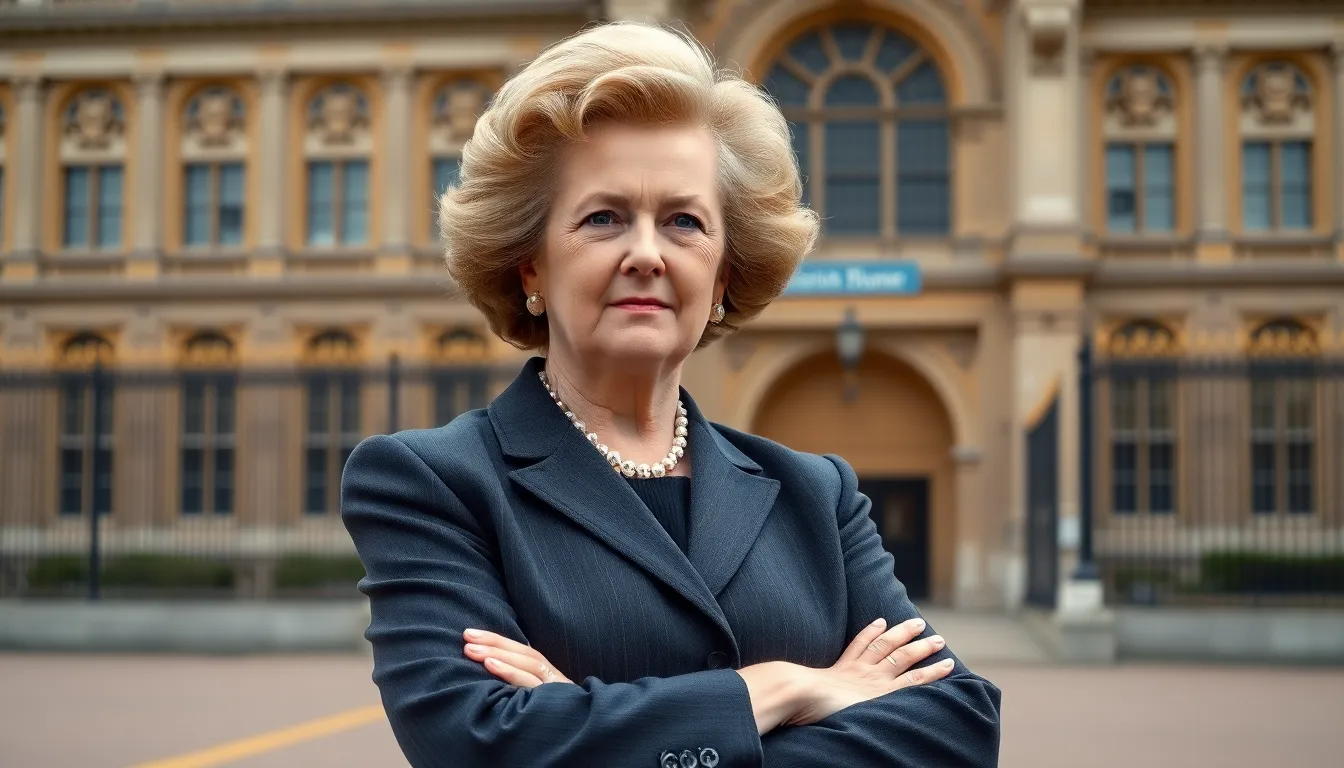Margaret Thatcher, one of the most influential figures in British politics, served as Prime Minister for an impressive eleven and a half years. Her tenure, from May 4, 1979, to November 28, 1990, marked a significant shift in the UK’s political landscape. Known for her strong leadership and controversial policies, she became the first woman to hold the office, earning the nickname “The Iron Lady.”
Thatcher’s time in power was characterized by economic reforms, a focus on free-market principles, and a resolute stance against the Soviet Union. As the longest-serving British prime minister of the 20th century, her legacy continues to spark debate and analysis. Understanding the duration and impact of her leadership provides valuable insights into modern British history and politics.
Table of Contents
ToggleOverview of Margaret Thatcher’s Premiership
Margaret Thatcher served as Prime Minister of the United Kingdom from May 4, 1979, until November 28, 1990. Her tenure marked a transformative era in British politics and economy.
The Timeline of Her Leadership
| Year | Notable Event |
|---|---|
| 1979 | Thatcher becomes Prime Minister. |
| 1982 | The Falklands War boosts her popularity. |
| 1984 | The miners’ strike showcases her firm stance. |
| 1987 | Thatcher secures a third term in the general election. |
| 1990 | Resigns after losing support within the Conservative Party. |
Thatcher’s leadership spanned over 11 years, making her the longest-serving British prime minister of the 20th century. Her administration featured significant governmental and societal changes.
Major Events During Her Time in Office
- Falklands War (1982): Thatcher’s decisive military action to reclaim the disputed Falkland Islands from Argentina solidified her image as a strong leader.
- Economic Reforms: Implemented various free-market policies aimed at reducing government intervention, leading to considerable economic growth but also significant social unrest.
- Miners’ Strike (1984-1985): This long conflict highlighted her uncompromising approach to trade unions and showcased the deep divisions in British society.
- Thatcher’s Third Election Win (1987): The Conservatives expanded their majority, reflecting public support for her policies, particularly in the face of economic recovery.
- Fall of the Berlin Wall (1989): Played a crucial role in the Cold War’s conclusion through her partnership with U.S. President Ronald Reagan, enhancing the UK’s global stature.
These events illustrate the complex legacy of Thatcher’s premiership, characterized by both achievements and controversies.
Key Achievements of Margaret Thatcher

Margaret Thatcher’s premiership showcased significant achievements in both economic policies and foreign relations. Her leadership transformed many aspects of British society and politics, leaving a lasting imprint on the country.
Economic Policies and Reforms
Thatcher implemented a series of economic policies known as “Thatcherism,” promoting free-market principles. She focused on reducing government spending, privatizing state-owned industries, and lowering taxes. Notable reforms included the privatization of British Telecom in 1984, British Gas in 1986, and numerous other utilities, which shifted many sectors to private ownership. These measures stimulated competition and encouraged foreign investment, contributing to the economic recovery during the 1980s. Unemployment rates initially rose but began to decline in the late 1980s, coinciding with an era of economic growth. Inflation fell significantly from double digits to around 3%, enhancing consumer confidence.
Foreign Policy Milestones
Thatcher’s foreign policy emphasized a staunch anti-communist stance. Her support for the United States during the Cold War strengthened the Anglo-American alliance. In 1982, her decisive response to the Falklands War bolstered national pride and her political standing, showcasing a strong military approach. She also played a pivotal role in easing tensions with the Soviet Union, meeting with leaders like Mikhail Gorbachev to discuss arms reduction. Her support of NATO’s strategy of deterrence contributed to the eventual end of the Cold War, fundamentally reshaping international relations. Thatcher’s foreign policy expertise positioned her as a key player on the global stage during a transformative period.
Challenges Faced by Margaret Thatcher
Margaret Thatcher encountered numerous challenges during her premiership, significantly shaping her leadership style and policies. Her time in office was marked by intense opposition, controversies, social unrest, and widespread strikes.
Opposition and Controversies
Thatcher faced substantial opposition from multiple fronts. Political rivals criticized her economic policies, labeling them as harsh and divisive. The Labour Party and trade unions, prominent voices against her reforms, organized campaigns to undermine her authority. The controversial introduction of the Community Charge, widely known as the “poll tax,” sparked protests nationwide. This policy ultimately damaged her public support and contributed to her resignation in 1990. Critics often highlighted her uncompromising stance on various social issues and accused her of ignoring the plight of the working class, further polarizing public opinion.
Social Unrest and Strikes
Social unrest characterized the 1980s in the UK, driven partly by Thatcher’s economic strategies. The miners’ strike from 1984 to 1985 exemplified widespread discontent. The strike, initiated by the National Union of Mineworkers, aimed to counteract proposed mine closures and job losses. Thatcher maintained a firm approach, leading to a protracted confrontation that tested her resolve and increased tensions between the government and unions. Other industries also faced strikes, reflecting broader dissatisfaction with austerity measures, rising unemployment, and reduced public services. These events underscored the challenges of implementing Thatcher’s vision while managing societal pushback.
Legacy of Margaret Thatcher
Margaret Thatcher’s legacy encompasses her transformative impact on Britain and the wider world. Her policies and leadership continue to shape political discourse today.
Influence on British Politics
Thatcher’s tenure redefined the Conservative Party and reshaped British politics. She emphasized free-market policies, individualism, and deregulation, which aligned the party more closely with conservative economic theories. Her approach to governance significantly reduced the influence of trade unions and shifted the political landscape towards neoliberal ideologies. She also reinforced the importance of leadership style, exemplifying a strong, decisive approach. Thatcher’s impact can be seen in the policies of subsequent Conservative leaders, as they often reference her principles.
Global Impact and Recognition
Thatcher’s influence extended beyond Britain. Her strong anti-communist stance positioned her as a key ally of the United States during the Cold War. She played a significant role in the events leading up to the fall of the Berlin Wall by fostering dialogue with Soviet leader Mikhail Gorbachev. Internationally, she earned respect for her leadership during the Falklands War and for her unwavering commitment to Western democratic values. Thatcher remains a prominent figure in global discussions on leadership and economic policy, symbolizing a pivotal era in world history.
Margaret Thatcher’s time as Prime Minister reshaped British politics and left an indelible mark on the nation. Her tenure, characterized by strong leadership and transformative policies, continues to spark debate and influence contemporary discussions. Thatcher’s legacy as the first female Prime Minister and her commitment to free-market principles and anti-communism remain significant in understanding modern political dynamics.
Even decades after her resignation, the impact of her policies is felt across various sectors in the UK and beyond. As political leaders and scholars reflect on her time in office, it’s clear that Thatcher’s influence will endure, making her a pivotal figure in both British and global history.




